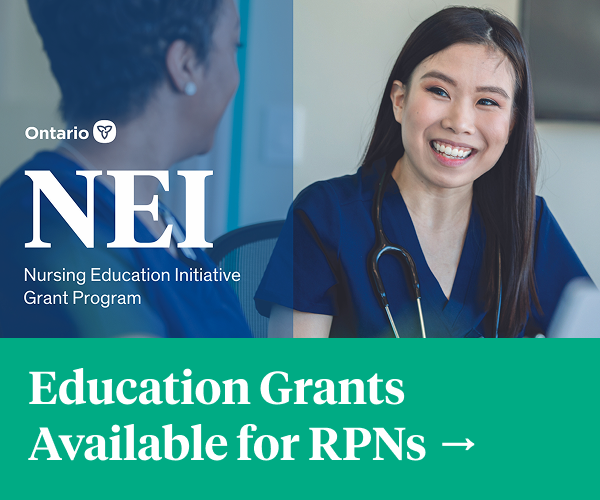Nursing is stressful (Edwards, Burnard, Bennett & Hebden, 2010). The associated stress begins in the academic setting and continues through to the work environment. Stress can lead to poor academic performance and limit social support networks, which in turn can negatively impact emotional and mental health (Del Prato, Bankert, Grust & Joseph, 2011). Having a mentorship initiative in the academic setting mitigates negative outcomes of stress, fosters self-care and well-being, and facilitates positive transition to the workplace. While research has shown numerous benefits of mentorship in postsecondary programs and nursing clinical healthcare settings, to date, little has been understood about peer mentorship in nursing classrooms. We hope to change that.
At Algonquin College (AC), students’ stress was observed in the Practical Nursing Program – an Ontario College Diploma program designed to prepare a diverse group of students with the knowledge and skills to work as practical nurses in the Canadian health care system. Within two years, students can complete this intensive program and apply to write the Canadian Practical Nurse Registration Examination in Ontario.
In January 2017, a research study was conducted to explore the impact of peer mentorship as a feasible method of promoting community and connectedness among students in the AC Practical Nursing Program. We hypothesized that peer mentors would be valuable, positive role models who could provide details about the lived experience of a nursing program with the goal of student success. The peer mentor relationship was defined as one of equality and friendship where the mentor assisted the mentee in the successful transition through the nursing program. Peer mentors were positive role models who offered valuable real-world experiences that were beneficial to first-level students. Peer mentors were not expected to have all the answers or provide formal supervision, education or evaluation of mentees.

Eighteen peer mentor relationships were formed and followed for eighteen months. Peer mentees from the first level of the program were self-selected and paired with mentors from all subsequent levels of the nursing program. Mentors were selected based on their interpersonal communication skills, academic performance and leadership qualities. The mentor-mentee pairing process captured the lived experience of nursing students at all levels of the program as well as transition to the workplace post graduation. Group interviews with participants were conducted, recorded and transcribed. Our findings illustrated many benefits to participation that include, but are not limited to: knowledge of college resources; enhanced therapeutic communication techniques and increased confidence; sense of belonging and togetherness through reciprocal sup-port and encouragement; enhanced learning and personal and professional growth; and development of leadership qualities. Additional data collection identified that participation in the mentorship program has beneficial, long-term impacts for both mentors and mentees that include a prioritization of mentorship strategies in both academic settings and work-related environments and an overwhelming desire to “give back”. These results informed the establishment of a Practical Nursing peer mentorship program and inspired curriculum.
Overall findings from this project have contributed to the development and implementation of an AC PN Peer Mentorship Program during the 2018-2019 academic year. All incoming Level 1 students in both the Fall and Winter terms were provided with the opportunity to participate; and Level 3 mentors were recruited from the same two academic terms. To date, the program has facilitated 81 mentor-mentee pairings across all four levels of the PN program. Surveyed in-formation illustrates that mentors and mentees maintain contact with each other via email, text messaging and face-to-face interaction averaging one to five hours/week. In addition, the PN curriculum was revised to include a written assignment to promote correspondence between Level 3 and Level 1 students about sharing personal success strategies in the program. To facilitate further interaction among all mentors and mentees, three college-sponsored social events were organized and attended in September, January and March. Alumni from the PN program attended these events and spoke about how their participation in the original research project has benefitted them in their transition to the workplace. Plans are underway to continue this initiative during the 2019-2020 academic year. Mentor recruitment for September 2019 was initiated in April, which marks the first opportunity for mentees from the Fall 2018 term to take on the new role of mentors. Offers to participate as mentees will be made to all incoming Fall 2019 Level 1 students.
This program has been successful as evidenced by the increased sense of community within the program and at the college overall. Further data collection will take place to quantify academic success, and explore how it has influenced professional well-being for transition to the work environment. This project is an innovative and easy-to-implement and -maintain strategy to foster well-being through belonging, self-care and the care of other nurses.
About Judy Flieler and Rachael Moutoussidis
Judy Flieler, RN MScN PNC(C), and Rachael Moutoussidis, RN BScN, are part of the nursing faculty at Algonquin College.
References
- Del Prato, D., Bankert, E., Grust, P. & Joseph, J. (2011). Transforming nurse education: a review of stressors and strategies that support students’ professional socialization. Advances in Medical Education and Practice, 6(2), 109-116.
- Edwards, D, Burnard, P., Bennett, K. & Hebden, U. (2010). A longitudinal study of stress and self-esteem in stu-dent nurses. Nurse Education Today, 30(1), 78-84.

